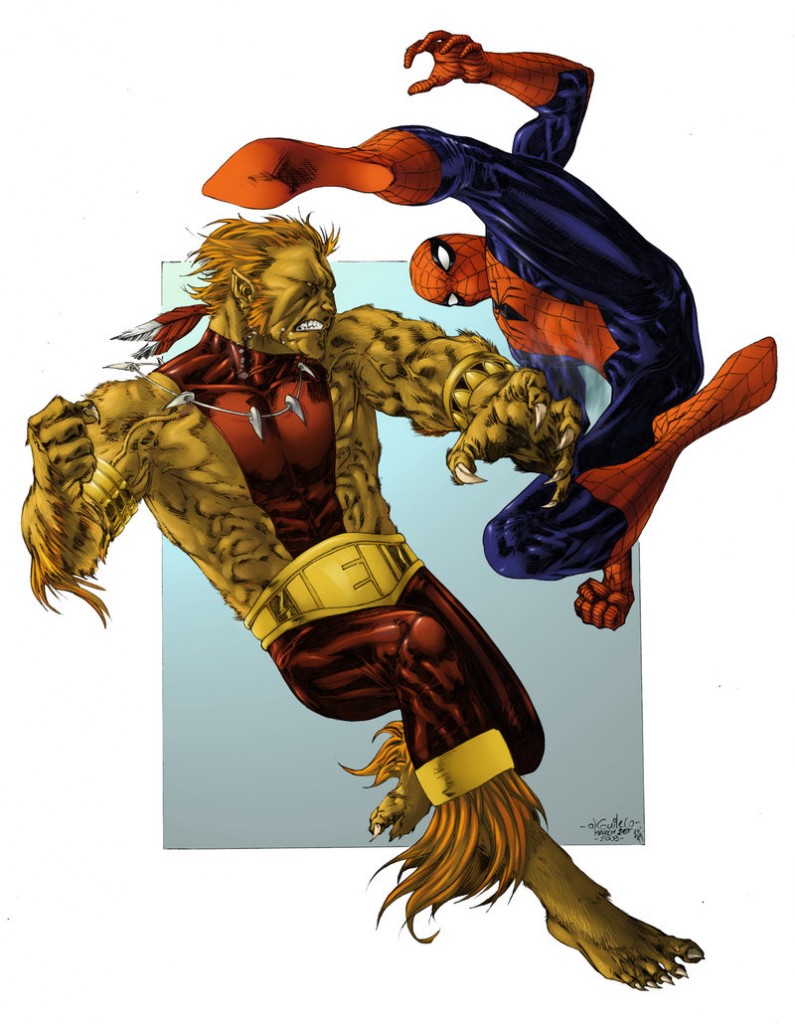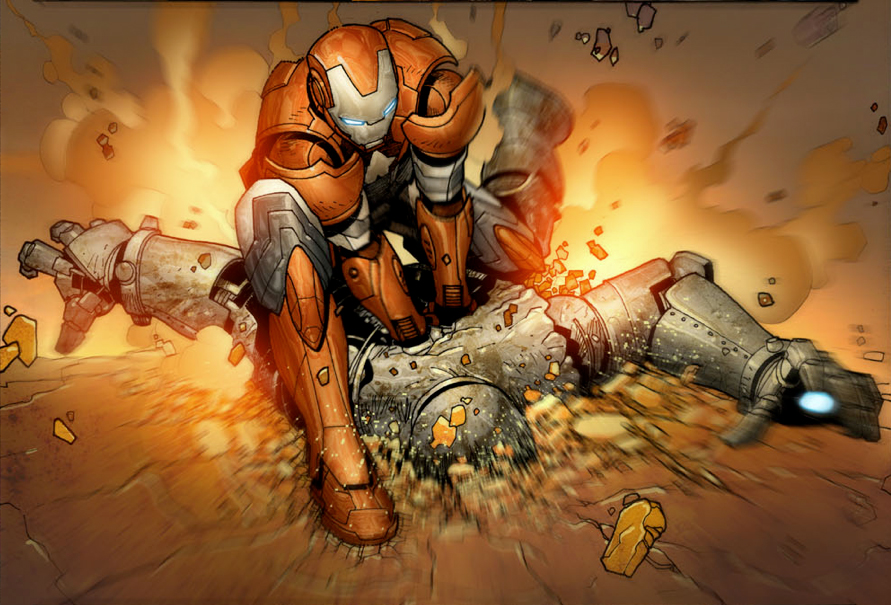So after our podcast this week, a listener wrote to me talking about how he was thinking about why the Iron Man comic hasn’t really translated into huge sales, given the enormous success of the movies.
Ian Warren writes:
The comic itself was further ostracizing. The movie “Iron Man” cherry-picked the most fun, glamorous, dynamic elements of the 60’s-80’s to put in. Any new reader picking up “Iron Man” expecting to see that version of Iron Man was in for a shock. Instead of likable, though rascally, fun-loving playboy Robert Downey Jr they got an unlikable pr!ck, working as the US Secretary of Defense and recently one of the architects behind a massive, unpopular Super-Hero Registration Act that almost tore the (Marvel version of the) US apart. So……..not exactly light, fun reading! And not the “Iron Man” they saw onscreen. Definitely not the “Iron Man” a kid would want to read or one a parent would want to buy for a kid (providing the parent would even go to a comic store/find a comic store to buy it!)
This topic made me start thinking about how many people buy comics based on what they have seen in the movies or on television. If Marvel is going to continue to make movies out of their incredible line up of characters, than at least they should start to have comics that reflect what is happening in the movies. Believe it or not, that is one of the reasons I stayed away from DC for a long time as a kid. I would watch the cartoons and the Batman and Wonder Woman shows and really love it! But then I would go to the store to pick up a comic and they would have Batman and the Outsiders (what the heck is an outsider and who is Geo Force?), Robin was no longer Dick Grayson, and Wonder Woman wasn’t fighting Nazis anymore. It’s not that I didn’t like the characters, they just had nothing to do with the characters I already grew to love.
So, I decided on Marvel instead. The continuity between the Spiderman cartoons and comics, was pretty much the same. Mysterio would try to steal some sort of statue or jewelry from a long-lost movie or something like that, and that would be the story. Cartoons and comics matched. Not so with ANY of the major companies these days.
However what is interesting is how relatively successful the licensed franchises are doing. Dark Horse knows what kinds of limits they push with their Star Wars line up. IDW is now doing very well with GIJOE and Transformers. They seem to be giving what the audience wants. And really, isn’t that what sells?
Ian went on to further comment:
I like that it’s the licensees that know how to do it right. Lucas, Paramount Studios, Hasbro, Joss Whedon, even the Jim Henson Muppet folks, dictate to the comic companies “Here are the characters, here’s what you can do, here’s what you CAN’T do. Have fun!” And generally the comics turn out well. When we were kids we read the “Star Wars” and “Indiana Jones” comics because they were close to what the movies were like and gave you a “quick fix” to tide you over ‘til the next movie came out. It was good for the comic (we kept buying ‘em!) and good for the movie studio (keeping interest in the franchises alive). Better yet, because we liked the comic adaptations we figured why not try another comic? ‘Gee, I liked the Spider-Man cartoon, maybe I should try this issue of “Spectacular Spider-Man”. Who’s this guy The Puma? I bet he’ll become a classic villain!’

And I have to add that on top of all this, DC and Marvel don’t make it easy for new readers. Their broad sweeping story lines can be daunting to a new reader for sure. Stand alone stories are a way better idea to get new readers. The idea of trying to get caught up on a character now seems daunting. I wouldn’t want to do it. If I wanted to start reading X-MEN, the thought actually gives me anxiety. It seems as though the writers champion existing readers by making stories about incidents from years ago, without any thought about trying to garner a new audience. What exactly is Marvel and DC doing to get a younger audience? To me, whatever it is, doesn’t seem to be enough.






I’d say that’s about bang on. But to solve the problem, you’d have to introduce ANOTHER line of movie based comics. New staus quo, start over fresh. But Marvel tried that with Ultimate, and where did it go? Right up it’s own continuity rear. The best bet for a new fan, especially kids, are things like Teen Titans Go! Or dig out some of the brilliant Batman Adventures. Those were exactly what’s needed. Single issue stories and a Batman that matches what people expect from Batman. Fans of the Nolan films are going to try and read about Dick and some kid named Damien?
Owen, you can’t have it both ways. In that podcast episode you bemoaned the fact Marvel keeps restarting books while DC continues their long running numbering. Now you’re upset Marvel and DC write to their existing readers. Your argument seems to blend new readers with young readers. As Chris Howard points out there is good material out there for young readers. Comic films aren’t produced for young viewers so we can address adult new readers coming to comics.
Franchise properties like G.I. Joe are successful comics since they require no continuity and run a few issues in a self contained storyline. Other franchise properties do well when tying into existing television or movie continuity like Buffy or Star Wars: we know the characters and the back story but fans can jump into the comics since they’ve followed the on screen stories. Changes are made but once it’s established we accept it: the Rhodes actor change between Iron Man 1 and 2 for example. You could watch Iron Man 2 without seeing the first one but it made a lot more sense if you saw them in order. Continuity and back story enrich the experience.
Marvel and DC seem to be trying that right now with new mini series featuring major characters in self contained stories, such as Avengers Prime and The Return Of Bruce Wayne. These stories are part of continuity but don’t need more than what’s in the book to provide an entertaining story.
The other item to consider is if people want to start reading monthly comics at all or would rather pick up a story of these characters at their local bookstore. They don’t care if it was a four issue mini series or if it took two years to publish: they buy the book and enjoy the story.
New readers are coming to comics through their local bookstore or online retailer with much fewer walking into a comic store for the first time. If your local shop is stellar like Big B Comics in Hamilton then you’re on your way; they have a great young readers section and the staff are friendly and will make great first reading suggestions to new readers young and old.
Comic book movies can be divided into two categories — 1) Movies based on popular long term comics properties, such as superhero movies and 2) those based on graphic novels or relatively new concepts.
1) Movies have not affected periodical comic book sales since the first Batman movie in 1989. It goes without saying that (for an example) a Fantastic Four comic book reader (past or present) will go and see a Fantastic Four movie, but it’s also been proven time and time again that the sales on Fantastic Four (the comic) will see not even a blip of an increase because of the movie. You might see people buying related books at the bookstore though, as the companies do cash in with reprint collections, encyclopedias, etc.
The only time there is a sales blip in the back issue bin is when there’s interest in a character that may be coming to the silver screen. Deadpool is rumoured to get his own movie and suddenly everyone wants New Mutants 98 and there’s 12 Deadpool appearances each month. Thor is getting a movie and there’s 8 Thor comics that no one buys so there can be 8 new tpbs on the shelf in the bookstore when the movie arrives.
2) Then there’s the Sin City effect. A niche graphic novel or series of graphic novels that has a following gets made into a movie and suddenly everyone wants to read the original source material. We’ve seen this time and time again — Sin City, Hellboy, Ghost World, 300, Watchmen, Scott Pilgrim and currently the Walking Dead.
If a known director or quality films were to make the Kill Shakespeare movie, everyone would be rushing out to buy the Kill Shakespeare graphic novel. When someone decides to make Jennifer’s Body no one cares that it’s based on a graphic novel.
There are concepts that straddle the line. Will the Green Hornet cause a spike in sales? Doubtful. Did the Spirit movie? Not at all. Aside from Watchmen, superhero themed movies do not sell superhero comics and I think the problem there lies in the fact that the superhero concept has moved beyond our medium and is now a movie and videogame genre. Westerns do not sell western comics. Science fiction movies do not sell science fiction comics. Horror movies DEFINITELY do not sell horror comics (as there are a zillion low-selling comics based on movie concepts.
Now spin-off comics based on movies and television shows used to be a much bigger deal, but they still can see some success if the fan-base is rabid enough for the material. Case in point Star Wars and Joss Whedon-concepts like Buffy, Angel and Serenity. Battlestar Galactica? Dead. The Ghost Whisperer? LOL. Dead. Transformers? On life support because of it’s nostalgia appeal, but kids aren’t watching Transformers and saying I must read that comic…. G.I. Joe has some nostalgia appeal and that movie didn’t help in any way whatsoever here.
Just a little word to say that the Spidey VS Puma piece was pencilled by me, Guile Sharp aka SpiderGuile!
Spidermafan2099 is the colorist! Thanks in advance for correcting the description.